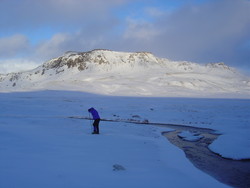Arctic data rescue, citizen-science, and collaborative research
IASC workshop hosted by IMO in Iceland
Progress in Arctic science is hampered by sparse data or data that are inherently difficult to interpret. Often data are hard to find or access and human intervention is necessary at multiple points on the path to utility.
In these cases machine-based data acquisition and/or analysis is impossible. It is, however, important to provide access to heritage data resources for climate and ecosystem research.
For this purpose, an international IASC workshop is hosted by IMO 11-12 November 2013. The venue is Forgarður at Bústaðavegur 7, Reykjavík. Background and further information is available at Arctic Rediscovery Project and IASC 2013.
A variety of data and/or information sources will be explored and new pathways to effective utilization across disciplines discussed. The sessions include:
-
The story of the Arctic - limited records: It's a critical and variable region, but historically very badly observed. What data exists and how can it be used?
-
What is intractable data? Examples include hand-written manuscripts, instrument traces, photographs and video/audio recordings. Where is it and how can it be utilized?
- Arctic research: challenges on land, sea and air
- Understanding long-term changes in Arctic sea ice
- What are the characteristics of successful citizen-science projects, in particular those factors most important for motivating broad participation from volunteers?
- How to build citizen science research projects? Details of setting up a Zooniverse project will be discussed, as will the design of the Citizen-Archivist dashboard at the U.S. National Archives and other citizen-powered projects.




